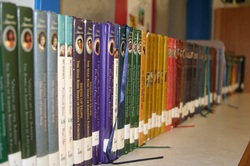5.3 Personnel, funding, and facilities
Candidates develop, implement, and evaluate policies and procedures that support teaching and learning in school libraries.
2010 ALA/AASL Standards for Initial Preparation of School Librarians
|
“It’s not about knowing all the answers. It’s about knowing where to find the answers.” – Unknown.
To be able to use information, it has to be organized logically. In addition to being a guide to information, the school library media specialist must be able to navigate a great deal of policies and procedures to carry out the operations of the media center. Organization and Access, SLM 502, was the course for behind-the-scenes knowledge. This task was to collaboratively create a wiki that selected the best policies and procedures from our respective school districts. We collected the policies on the different topics and held discussions on the pros and cons of each district’s unique spin on the topic. We then created the wiki of “our” policies and procedures. |

The greatest thing I learned from the wiki project is that Montgomery County Public Schools (MCPS) is such a large system that policies and procedures affecting more than one department tend to be spread out all over the place. For example, there is a procedure in place for evaluating support staff, but media clerks and building service workers both fall into this category. There is no librarian handbook; instead, there is an online forum which I will gain access to once I am a school library media specialist. I was surprised while learning about the ordering process and how everything from paperclips, to books, to televisions, to file cabinets, to buses for a field trip goes through the Financial Management System. It's a tight ship! But it applies countywide as well. Trainings are specific to that system, rather than to librarians. All staff that order items are trained in the same way, from the physical education resource teacher ordering basketballs to the art teacher ordering paint. I will definitely need to keep a "how-to" journal from day one. The benefit to a web-based version is that it is accessible anywhere I have internet access, yet can also be saved on my local computer.
This being a collaborative project developed by candidates across different school districts, I learned a great deal about running the school library through the wiki project. The time we took as a peer group to discuss the pros and cons of each topic, in light each district’s take on the topic, helped deepen my understanding of the “why” behind many of the policies. It was interesting to see how accessible (or not) certain counties policies and procedures were. Some counties have very little, some have a compact handbook that is specific to media center operations, and some, as was the case in MCPS, have their policies and procedures spread out over many departments. There is much to protect in the media center: ensuring equitable access, privacy, and freedom to read. I’ve always deeply believed that information is power. All people have a basic right to access information freely. Censorship in any form restricts thought and growth. It will be nice to work in a field where I have such back up on these beliefs.
If I find myself questioning a policy or procedure in the future, I know there is variety across districts and researching similar policies may give me data and examples to use in advocating for change. This lesson will influence my practice because I see the importance of curating all of these policies and procedures in one, easy to navigate location. It will increase my efficiency, leaving me more time for direct instruction.
This being a collaborative project developed by candidates across different school districts, I learned a great deal about running the school library through the wiki project. The time we took as a peer group to discuss the pros and cons of each topic, in light each district’s take on the topic, helped deepen my understanding of the “why” behind many of the policies. It was interesting to see how accessible (or not) certain counties policies and procedures were. Some counties have very little, some have a compact handbook that is specific to media center operations, and some, as was the case in MCPS, have their policies and procedures spread out over many departments. There is much to protect in the media center: ensuring equitable access, privacy, and freedom to read. I’ve always deeply believed that information is power. All people have a basic right to access information freely. Censorship in any form restricts thought and growth. It will be nice to work in a field where I have such back up on these beliefs.
If I find myself questioning a policy or procedure in the future, I know there is variety across districts and researching similar policies may give me data and examples to use in advocating for change. This lesson will influence my practice because I see the importance of curating all of these policies and procedures in one, easy to navigate location. It will increase my efficiency, leaving me more time for direct instruction.

This portfolio and the artifacts contained herein by Amy Soldavini are licensed under a Creative Commons Attribution-NonCommercial-ShareAlike 3.0 Unported License |
Revised July 2013
